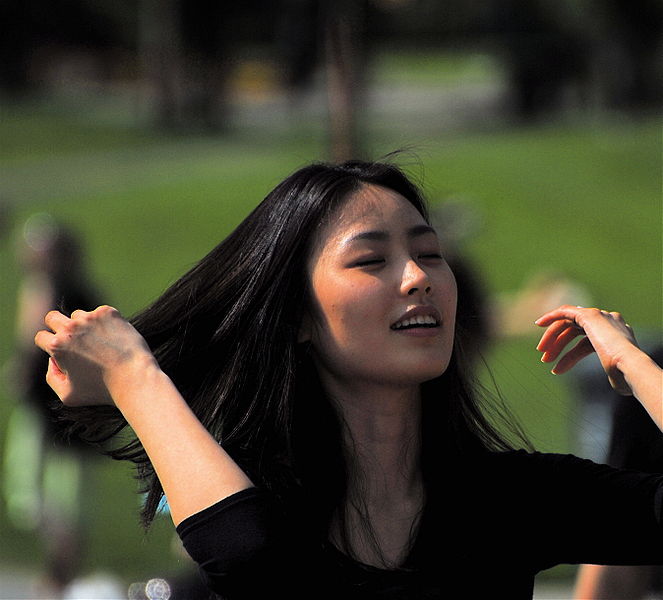Julie Chen Shows Problems With Asian Standards Of Beauty

For those who haven't heard about Chen's disclosure on "The Talk" (The View’s less cheesy cousin), news anchor and TV personality Julie Chen admitted that she underwent surgery on her eyes to make them look bigger.
Though I have no opinion on her decision to change her eyelids, I am overjoyed that this issue is now mainstream. The trend of changing one’s upper eyelid is extremely common amongst Asian and Asian-American females. The small crease on the upper eyelid simply makes the eyes look bigger and more expressive. For those who don't know about the crease in the upper eyelid (AKA non-Asians), this crease is unnoticeable and simply unheard of.
You can tell that one's face looks different with and without the eyelid crease, but it's difficult to pinpoint how the before and after pictures may be different. For those who haven't worried about an eyelid crease, it makes no difference. but for Asian females, it is an obsession.
I was raised in a fairly traditional East Asian household in a large East Asian immigrant population. When my parents found that their daughter did not have two eyelid creases, they were not overjoyed. You see, I have a crease on my left eye. I do not on my right eye. Though not having creases is only considered ugly in my culture, it is unacceptable to have asymmetrical eyes. This fact changes the way other Asians judge my face, how I do my makeup, and how I apply my eyeliner each day.
My parents tried everything - tapes, massages, praying I would "grow into" my crease. My mother even begged me when I was a child to get surgery on my own eyelids, like she did 30 years ago. Some of my friends from home would even fly back to Taiwan to "fix" their eyelids because it was cheaper there and had more experienced surgeons. My mother argued I would be less self conscious of my face, I would be more respected within our community and that I would be noticed by Asian girls as approachable and pretty. To this day, she still asks me if I want surgery because my eyes have yet to be "fixed".
The criticism doesn't end there. it is popular in places like China to remove muscle from calves and thighs so girls look thinner. My mother used to give me whitening cream (which is also popular among Indians and Indo-Americans) because my skin was too dark - a biological feature I got from my father, who is darker skinned. Many East Asian pop stars opt for surgery to reconstruct parts of their cheeks and chin in order to have a less square or round facial shape. This body dysphonia may seem extreme - but for someone who received the same criticisms as virtually every other Asian female, I can tell you, fixing our bodies is common.
I have no anger or qualms with my parents because I know they were brought up a certain way. I now realize it sheds some light on the way Asian girls and women are supposed to look both in Asia and in the States. Because I have asymmetrical eyes, darker skin and wavy hair, Asian families in my hometown don't know how to react to me. But in Caucasian communities, I never knew which Cabbage Patch Kid, Barbie doll or American girl doll to choose because they never looked like me. Instead, I picked features I liked - straight dark brown hair, light blue eyes, fair skin. The more I liked these features, the more I subconsciously and consciously hated myself.
These micro-aggressions come into play in the world outside of dolls. In my childhood, and even now, I am constantly reminded of the fact that every billboard, every commercial, most characters on TV and most people in power have never (and I am doubtful will ever) look like me.
There are more days I wake up wishing I were a white female than days appreciating my own face in the mirror. If I looked like someone else, people would tell me I'm pretty, approachable, be taken more seriously. If I looked less Asian, people would stop asking where I'm from or how fluent my English is.
There is a very sickening view of beauty standards for women. I strongly argue that men don't have it much better either. and for all of those in-between men and women, well, good luck with that because we tend to think beauty is simply binary. My criticism of the female standard of beauty is endless - body hate, age bashing, our criticism of mere bone structures is absolutely astounding and it hurts everyone. But the idea that Asian women deal with a very unique set of criticisms that no woman of a different heritage or skin color will ever deal with is indicative of the fact that Asian beauty-bashing is still relatively silent.
This is not only about Julie Chen making herself look less like the people she represents, but also conforming to a standard of beauty as a whole from both Eastern and Western hemispheres. We have people like Julie Chen and Lucy Liu on TV because they look a little less Asian than the people who don’t make it into the mainstream.
This unique and twisted self-hate, something that Julie Chen and I share, is hopefully the start of some dialogue on our notions of beauty. I hope, in my own way, that I can be like her one day - to be in a position to tell others about the struggles Asian Americans face in the name of “americanness” and femininity.
Reach Contributor Cat Shieh here.



